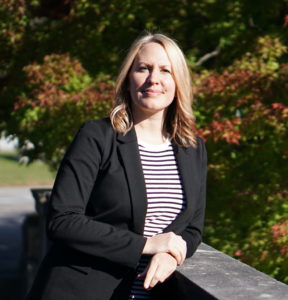About Rachel

Rachel Sikorski, LCAT, ATR-BC, RPT-S is a NY Licensed Creative Arts Therapist (LCAT), registered and board-certified art therapist (ATR-BC), and registered play therapist/supervisor (RPT-S). She is a long-time professional member of The American Art Therapy Association (AATA) and its New York chapter (NYATA); The Association for Play Therapy (APT) and its New York chapter (NYAPT); as well as The EMDR International Association (EMDRIA). Rachel has been providing mental health treatment to children, adolescents, adults, and families for over 17 years.
Rachel specializes in the creative integration of the visual arts and therapeutic play into traditionally talk-based psychotherapy approaches, to adapt treatment to the unique needs of individuals of all ages and, in particular, the treatment of anxiety, depression, and posttraumatic stress in children as well as adults with complex childhood trauma. Rachel has extensive professional training and a wealth of experience utilizing trauma-informed, solution-focused, somatic, and mindfulness-based approaches to psychotherapy in clinical practice. She was fully trained in the trauma resolution methods of PC (Progressive Counting) and EMDR (Eye Movement Desensitization and Reprocessing) in 2013; and completed EMDR renewal training in 2022. Rachel continues to engage in regular, ongoing professional development to stay up to date on the latest research and clinical adaptations of trauma work for treating a variety of mental health symptoms and conditions, including best practices in working with children and adults with complex trauma and dissociation.
Her professional experience includes several years of work supporting adolescents with intellectual disabilities and neurodevelopmental disorders in the community; adolescent youth experiencing emotional-behavioral disturbance and related conditions in special education and residential treatment; as well as children, adults, and families in outpatient mental health clinics and school-based settings. Rachel has experience working with a variety of client populations, including those with trauma, attachment, and adjustment-related disorders; anxiety, mood, and dissociative disorders; oppositional and conduct-related behavioral disorders; self-harm and suicidal ideation; as well as neurodevelopmental disorders associated with executive functioning impairment such as ADHD/ADD and ASD.
Rachel served as a part-time adjunct lecturer and Art Therapy Minor Program Coordinator at Buffalo State University for several years. Her goal therein, and as an advocate for increasing access to professional art therapy and quality mental healthcare more broadly, was to educate the public and expand the reach of art therapy to communities in need. Rachel firmly believes that increasing affordable access to graduate-level training in art therapy will increase representation from and accessibility to more culturally and racially diverse art therapy professionals within the underserved communities of Buffalo and in the field as a whole. Rachel continues to advise the department and educators within the art therapy curriculum courses, despite recently stepping back from teaching and advising roles there; she remains hopeful that the art therapy minor program might continue towards expansion despite ongoing pandemic-related changes and state budgetary concerns that have affected the realization of a local graduate-level training program at Buffalo State, a major focus of her work during her time there. Rachel has and will continue to prioritize advocacy efforts for art therapy accessibility and insurance coverage on local, state, and national levels.
For more information about how you can help support related advocacy efforts in New York State, please get in touch with your state representatives about the need for their support of NY Senate Bills S6362 (Assembly Bill A6173) and S8715 (Assembly Bill A9018); or, visit www.lcatcoalition.org.
